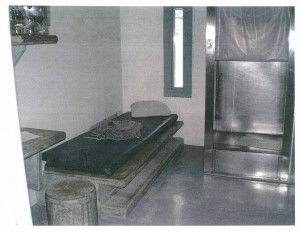Last week, representatives of six nonprofit organizations critical of solitary confinement met in a closed-door meeting in Washington, D.C., with the team hired to conduct an internal audit of the federal Bureau of Prisons’ controversial “segregation” policies.
The idea for an audit came out of Senator Dick Durbin’s June 2012 Senate hearing on solitary confinement, where BOP director Charles Samuels was grilled on the federal prison system’s use of solitary, especially on prisoners with mental illness. Further criticism emerged from media coverage, lawsuits, and a scathing report from the Government Accountability Office, which found that the BOP did not know whether its use of “segregated housing” had any impact on prison safety, how it affected the individuals who endure it, or how much it all cost American taxpayers.
The audit team is led by Ken McGinnis, the former warden who directs correctional programs at CNA, a Virginia think tank known primarily for military contracting. CNA is beginning a one year, $498,211 contract to provide a “Special Housing Unit Review and Assessment” for the National Institute of Corrections, which is itself an arm of the Bureau of Prisons.
On November 11, McGinnis and several colleagues met with representatives from the American Civil Liberties Union National Prison Project, National Religious Campaign Against Torture, CURE, Vera Institute for Justice, National Association for Mental Illness, and Prison Fellowship–a group that, according to participants, hopes to function as a sort of advisory committee to the auditors. Among other things this group has asked to receive briefings as the study progresses and to provide feedback to the final report. The group does not include any formerly incarcerated people or family members of those currently held in solitary.
According to individuals who attended the meeting, McGinnis described his plans to tour several different prisons, including the government’s notorious supermax, ADX Florence in Colorado, as well as Special Housing Units (SHUs) and Special Management Units (SMUs). An overview of the audit provided by CNA states that the project will make “an operational assessment of 8 BOP special housing units that will include at a minimum 1) Florence ADX, Florence SHU and Florence SMU; 2) Either Allenwood SHU and SMU or Lewisburg SHU; 3) Three additional SMU’s are yet to be to be determined.” (For descriptions of SHUs and SMUs, see our earlier post on the subject.)
In the end run, according to McGinnis, as many as 13 units may be inspected. Teams of experts will be dispatched to these facilities over the next few months to tour the facilities, and talk with the people who run them and the prisoners held there. McGinnis did not say whether prisoners would be interviewed without corrections staff present, or given the opportunity to fill out anonymous surveys–methods that are widely considered to be the only way to get candid information from people who are currently incarcerated.
Among CNA’s tasks will be “a comprehensive review of the Bureau’s mental health assessment process.” This controversial subject has been addressed in recent lawsuits and media reports, which show that numerous individuals with serious mental illness are being held at ADX, in violation of the BOPs own clear policy directives.
The audit will also review “the application of inmate due process rights…during duration of placement within SHU at ADX and or SMUS.” These due process rights, for the most part, consist of pro forma hearings and reviews, presided over solely by prison officials. Some critics argue that these processes lack even a semblance of fairness or independence.
The audit will pointedly not include “any inmates with Special Administrative Measures (SAMs),” which ban virtually all communications between those in prison and the outside world, and even permit monitoring of attorney-client communications. The auditors will not enter the section of ADX called H-Unit, which holds a group of the most restricted, high-security prisoners, including Ramzi Yousef (1993 World Trade Center bombings), Zacarias Moussaoui (9/11), and Ahmed Ghailani (US embassy bombings in Kenya and Tanzania).
According to one court document, individuals in H-Unit have had their mail suspended and their phone privileges and contact with immediate family members denied. Every phone call, every piece of mail is closely monitored by the FBI–and some, according to the prisoners, is discarded, including pleas for help to attorneys. H-Unit banned prisoners from receiving books by President Obama, along with such innocuous publications as a book on world history, sports magazines, and even a magazine on crocheting. Individuals held at in the unit have been subjected to force feeding when they go on hunger strikes. (See “Voices from Solitary: Life in H-Unit, ADX Federal Supermax.”)
What is particularly unusual about H-Unit is the extent to which the FBI appears to be involved in it operation. (The FBI has no statutory authority to operate inside of federal prisons.) According to court documents, FBI agents listen in on phone conversations, read mail, and dictate punishments–even when BOP personnel object.
Solitary Watch asked Shaina Vanek, the contracting officer in charge of the study and a National Institute of Corrections spokesperson who attended the meeting, confirmed in an email: “the review of the Bureau of Prisons use of Restricted Housing excludes a review of inmates with Special Administrative Measures (SAMs) and also the H unit at the ADX. The BOP has a population of approximately 219,000, and 54 inmates have SAMs.”
While the numbers are indeed small, these individuals are subject to the most extreme, and potentially torturous, form of solitary confinement; their exclusion means that such practices will receive no review whatsoever.
According to one attendee at the November 11 meeting, McGinnis and his team seemed eager to secure “buy in” from the advocates present and to produce a report that will be accepted by them. One of the advocates was asked to represent the group in future communications, and another meeting may take place in the new year.
Contributions to this article have been made by Jean Casella.









